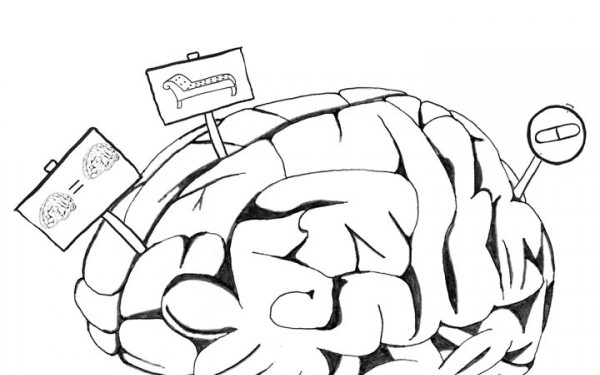Men Need to Talk About Their Mental Health
Q&A With Four Men
Three words. One loaded question: “How are you?”
One usually evasive answer: “Fine.”
But things aren’t “fine,” and men, you have to start being honest with us. How are you, really?
Referred to as the “silent crisis” by the Canadian Mental Health Association and a relatively new concept in Canada, studies show men have a high rate of mental health issues and difficulty seeking help for it.
Statistics Canada’s suicide study in 2009 found that men were three times more likely than females to die by suicide. Suicide also ranked second as the leading cause of death for males 15 to 34 in Canada. And this devastating trend expands past Canada: studies done in the United Kingdom showed depression and suicide rates increased among young males. In Australia, suicide has replaced car accidents as the leading cause of death for males since 1991. “Fine” isn’t working anymore.
Luckily, men have started talking about their mental health—it’s shifted from being a secret to a life or death issue. Doctors, families, and peers are becoming aware of the sleeping silence of the pain men are suppressing everyday.
Dr. Michael Myers, a psychiatrist and clinical professor in the Department of Psychiatry at the University of British Columbia noted that doctors are now paying more attention to the topic. They especially keep an eye out for potential signs of depression among men, such as hostile behaviour, womanizing, substance abuse, and irritability.
To find out more, I spoke with five men about their mental health, asking each one why it’s important to talk about it, especially now. Meet Seb, Antonio, Mike, and Andrew.
Seb is a 28-year-old trans Concordia graduate with depression and anxiety. Antonio Bavaro is a male in his mid-twenties who works in Toronto and has been “chasing the dragon” his whole life. Mike Allison is a 32-year-old skateboarder from the Maritimes now studying at University of Toronto, who’s in recovery for substance abuse, and Andrew Carter is a 52-year-old cis-gender white male who has depression, and is also the host of Montreal’s CJAD morning radio show.
***
THE LINK: Are you or were you hesitant to talk about your mental health?
SEB: I did hesitate. […] There is definitely still a stigma around it.
MIKE: I don’t find it difficult anymore, but for years I did. As a man, there’s that stigma of not opening up to your friends. Luckily as I got older, I noticed that this wasn’t the case with my friends. Obviously, this was with a select few within my group. Personally, I refuse to acknowledge the stereotype of men being “tough.” It’s bullshit. The reason that I open up so freely is so that I can share an example, and let people and other men know, it’s alright to talk about these things.
ANTONIO: I don’t hesitate at all—men need to talk more about what’s going on inside in general, and I’m lucky enough to feel free enough to do so. I’ve been open with my parents 110 per cent since I was a child. I had to be open with my mental health issues when I started post-secondary education because it affects my studies so much.
ANDREW: Hesitant? Not now. There was a time I would have hesitated out of lack of understanding; I didn’t even understand I had an issue. […] I was always one of those, “Oh suck it up types, it’s not real,” but it’s real.
TL: When did you start talking about your mental health—what changed?
SEB: Over the last few years I’ve been talking more about it. I started going to therapy just before I started transitioning. I’ve been very honest with my partners about my depression and anxiety, and the ways it can affect our relationships. At that moment I was being honest with everyone about being trans, and discussing my mental health was a natural extension of that since they felt very related.
MIKE: I got to a point in my life where I was so broken and depressed. I began sharing openly with friends who I was using with and started plotting my way out. I hit my bottom and it was just not an option to keep quiet about it anymore. I had to share it with people in order to save my life.
TL: What do you think prevents men from talking about their mental health?
SEB: I do believe it’s more difficult for men because there is a culture of toxic masculinity where discussing mental health will be seen as weak or talking about emotions is a “woman thing”. It really depends on the context too, as a trans person I feel it has its own stigma attached to it because people already think being trans is a mental illness, and so any mental health issues I might have are assumed to be associated with that. It’s reductionary and difficult for me to break out of that pattern with cis therapists.
ANTONIO: I find some women and feminists unwilling to accept that men have more issues with mental health, as most go unreported. Why else would three out of four suicides in Canada be men?
TL: When and how did you seek help?
SEB: I did reach out for help when I realized some aspects of my anxiety were impacting my relationships and my functioning. I’ve been in therapy on and off over the last few years, tried medication and self-medicating. I used the McGill mental health services without success, and when that failed I went to [the queer community resources] ASTTeQ and Project 10 for referrals to trans-friendly therapists, as well as financially accessible ones. Money has definitely been one of the biggest barriers for me in accessing these services, since most of them aren’t covered.
MIKE: When I began actively wanting to address my mental health I found it challenging to find the resources. In an act of desperation, I reached out in a post on Facebook. This did two things for me: it held me accountable and it put me in touch with a variety of people who either had experience with it or knew someone who did. Through that I got into a detox centre and started my path of recovery.
ANDREW: When I understood what [depression] was and that it was real and it needed to be dealt with.
***
Andrew went to therapy, support groups, and has tried antidepressants. He said therapy and antidepressants have helped him, as well as being open with others.
What if we didn’t believe in the stigma? What if you—the male-identifying reader—could address the shame or embarrassment associated with talking about your mental health, reducing its power and setting it free?
From my experience, it takes more courage to be vulnerable than it does to be silent. Silence is dishonest. These four men shared the truth, a truth that will always be there: a truth that challenges the toxic culture of masculinity, as Seb noted. A truth that puts equal weight on a man sharing his emotions, as a woman does her’s, like Antonio mentioned. And a truth most of us want to hear—and help with—such as with Mike’s friends and Andrew’s story.
It’s going to take time to set aside years of a male “dominant” stereotype, to change the narrative, to encourage men to be brave in a different — and sometimes uncomfortable — manner. Let’s not sleep on this anymore, it’s time to dismantle the stigma and reconstruct our perception. We’ve been hitting snooze for too long.




_600_375_90_s_c1.jpg)

